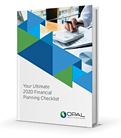Give to Charity, Get a Tax Break with Donor-Advised Funds
By Joseph N. Filosa, CFP® | December 4, 2019The latest round of tax reform has had a pretty significant impact on charitable giving, specifically when it comes to writing off donations. This is because certain tax deductions are only available if you choose to itemize, rather than taking the standard deduction. Charitable donations fall into this group, but something called donor-advised funds are a great work-around.
The new tax law almost doubled the standard deduction—bringing it up to $12,200 for individuals; $24,400 for couples filing jointly. Translation: for many families, it makes more financial sense to take the standard deduction and call it a day (meaning they miss out on claiming that deduction for charitable giving).

It’s a different story for high-net-worth folks who are able to use charitable donations to get over that threshold and continue itemizing. The problem, however, becomes finding charitable causes to give sizeable amounts to throughout the tax year. You obviously want to give to organizations you connect with and that are doing good work in the world.
A donor-advised fund pulls double duty, letting you donate to your favorite causes while also getting a tax break. Here’s how they work.
What Are Donor-Advised Funds?
They allow you to make contributions to a fund that’s specifically earmarked for charitable giving. You put money in and can then recommend grants from that fund to go to causes you care most about. An added perk is that you can do so at any time. Your donations will be there waiting until you’re ready to disburse them; there’s no time limit.
Meanwhile, your contributions to the fund will be tax deductible if you end up itemizing. For example, you could make a lump-sum contribution of, say, $50,000 before the end of 2019, then donate to your favorite causes at some point in the future—and you’ll still get a tax break for the 2019 tax year if your overall deductions exceed the standard deduction cap. It’s a win-win.
Speaking of taxes, you can also use this type of fund to bunch your charitable contributions. All this means is putting twice as much into your fund one year, then abstaining the following year. Alternating like this lets you itemize every other year.
What Can You Contribute to a Donor-Advised Fund?
Donor-advised funds are a great way to put some muscle behind your charitable contributions and bring down your tax bill at the same time. It’s also an opportunity to use your money in a way that’s aligned with your values and supports organizations that are making a positive impact.
Another benefit is that cash isn’t the only thing you can put into to a donor-advised fund. You can also contribute appreciated assets, which lets you sidestep capital gains. Let’s say, for example, you’d love to sell some stock and donate the proceeds to a worthy charity. Doing so would require you to pay capital gains tax on that transaction. With a donor-advised fund, you could donate those shares directly into the fund, write off the full value on that year’s tax return, then make your charitable donation whenever you like. Donor-advised funds also allow you to contribute real estate, mutual funds and more.
What’s more, the funds you put in can be invested prior to being donated, creating an opportunity for more growth. An added benefit is that you won’t be taxed on this growth because assets that are in the fund are technically owned by the fund’s sponsor.
How Do I Manage a Donor-Advised Fund?
As the IRS reports, these types of funds are actually maintained and run by a sponsoring 501(c)3 organization that has legal control over it. Don’t let that discourage you, though; you’ll still have advisory privileges that let you distribute the funds as you like and invest its assets as you see fit. If you need help with the latter, an experienced financial advisor can guide you.
With the end of the year right around the corner, charitable giving is top of mind. Opal Wealth Advisors can help you use a donor-advised fund to maximize your efforts—and there’s still time to take advantage before the new tax year begins.
Be a Smart Investor
Stay up-to-date with industry-leading information and news delivered straight to your inbox.
Get our timely insights delivered to your inbox (Blog)
Please remember that past performance may not be indicative of future results. Different types of investments involve varying degrees of risk, and there can be no assurance that the future performance of any specific investment, investment strategy, or product (including the investments and/or investment strategies recommended or undertaken by Opal Wealth Advisors, LLC [“OWA]), or any non-investment related content, made reference to directly or indirectly in this commentary will be profitable, equal any corresponding indicated historical performance level(s), be suitable for your portfolio or individual situation, or prove successful. Due to various factors, including changing market conditions and/or applicable laws, the content may no longer be reflective of current opinions or positions. Moreover, you should not assume that any discussion or information contained in this commentary serves as the receipt of, or as a substitute for, personalized investment advice from OWA. OWA is neither a law firm, nor a certified public accounting firm, and no portion of the commentary content should be construed as legal or accounting advice. A copy of the OWA’s current written disclosure Brochure discussing our advisory services and fees continues to remain available upon request or at www.opalwealthadvisors.com. Please Remember: If you are a OWA client, please contact OWA, in writing, if there are any changes in your personal/financial situation or investment objectives for the purpose of reviewing/evaluating/revising our previous recommendations and/or services, or if you would like to impose, add, or to modify any reasonable restrictions to our investment advisory services. Unless, and until, you notify us, in writing, to the contrary, we shall continue to provide services as we do currently. Please Also Remember to advise us if you have not been receiving account statements (at least quarterly) from the account custodian.



